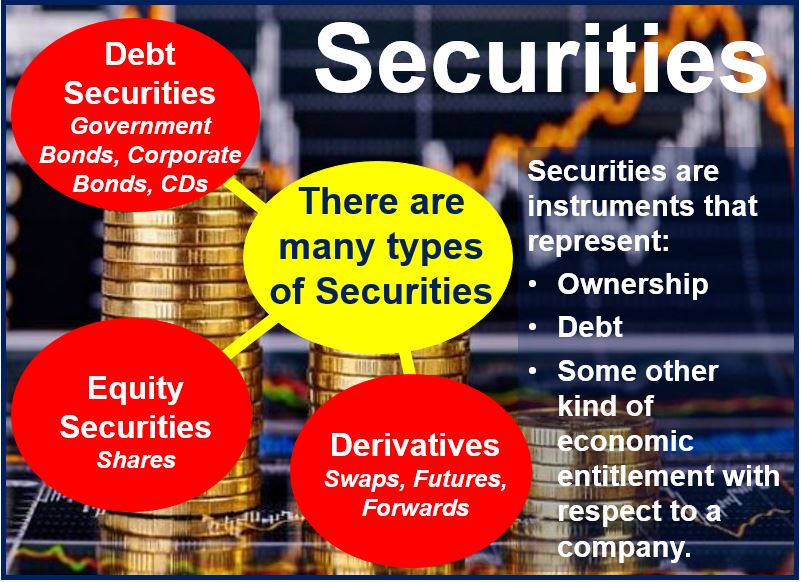What are securities? Definition and meaning
Securities are contracts to which we give a value and then trade. This may be a bond, a mortgage-backed security, or a share. In the UK, ‘gilts’ are the equivalent of US Treasury securities.
A security is a financial instrument, i.e., a monetary contract between parties which people trade.
Put simply, a security is any proof of ownership or debt that has a value and that we can sell.
We usually divide them into debt securities, equities, and derivative contracts:
Debt Security – this represents money that an entity has borrowed and must pay back. The arrangement is detailed beforehand, including how much is borrowed, at what interest rate, plus renewal or maturity date.

A certificate of deposit (CD), for example, is a security. So are corporate bonds, government bonds, and preferred stock.
Equity security – refers to the ownership interest in a company by shareholders, such as shares (stock). A holder of an equity security can profit from capital gains.
If the company makes a good profit, the equity security holder shares in this gain. This is not the case with a holder of a debt security. A debt security only gives you interest and the repayment of the capital.
Traditionally, companies raise new capital through securities, which offer certain advantages over bank loans.
Derivative contracts – we also call them ‘derivatives’. They represent a contract between two parties that specify conditions, such as dates, resulting values and definitions of the underlying variables, the contractual obligations of each party, and the notional amount that the two parties established for making and receiving payments.
Examples of derivatives include options, swaps, futures, and forwards. Variations of forwards such as caps, floors, collars, and credit default swaps are also derivatives.
Traders buy and sell most derivatives through an exchange, such as the Chicago Mercantile Exchange. We can also trade them off-exchange, i.e., over-the-counter.
Security – guarantees on loans
When an individual is taking out a loan, ‘security’ could mean collateral, i.e. an asset that the borrower pledges. If the borrowers fails to pay back the money, the lender can subsequently seize that asset.
In many countries, when people take out a mortgage, the house is the security, i.e., the collateral.
If the borrower cannot repay the loan, the lender has recourse to seize the home and sell it.
Certified securities
A certified security is in paper, i.e., physical, form. There are two different types:
Bearer securities – these are negotiable financial instruments which contain no information on ownership. The bearer is presumed to be the owner – they can be bought and sold to anyone. However, because of increasing digitization, this type of security is becoming rare.
Registered securities – any virtual security which people trade is a registered security. The owners’ names are recorded by a registrar – the issuer or the issuer’s agent.
U.S. Securities and Exchange Commission
The U.S. Securities and Exchange Commission is the U.S. federal agency that makes sure day traders and other security traders obey the law. A day trader is somebody who buys a security and sells it on the same trading day.
To draw an analogy, it is similar to what the FDA (Food and Drug Administration) is for the pharmaceutical, food and medical device industries. However, it focuses on security traders rather than drug makers. The SEC makes sure that traders are honest and fair. It also protects investors.
The SEC can impose fines, referral for criminal prosecution. It can also revoke or suspend traders’ licenses.
The SEC writes on its website:
“The mission of the U.S. Securities and Exchange Commission is to protect investors, maintain fair, orderly, and efficient markets, and facilitate capital formation.”
Some countries have one large agency that covers all financial products. The United Kingdom, for example, has the Financial Services Authority (FSA).
Trade organizations for securities dealers
The main trade organization for securities dealers in Europe is the International Capital Market Association.
The main trade organization for securities dealers in the U.S. is the Securities Industry and Financial Markets Association.
Most securities are bought and sold in capital markets. Examples of highly-organized capital markets are NASDAQ, the New York Stock Exchange, and the London Stock Exchange.

